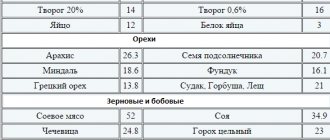How much weight can you really lose in a month?
Excess weight makes it easier to lose weight. The more a person weighs, the easier it is to lose excess weight. The hardest thing to get rid of are the last few kilograms, or rather two to five. The main thing is to lose weight correctly. You can't stick to a strict diet. Otherwise, health problems cannot be avoided.
Don't neglect training. Some calories are lost during exercise. Thanks to various variations of weight loss, including those based on proper nutrition without physical activity, as well as using training, gym classes, jogging and more.
How much can you lose without exercise and on proper nutrition in a month?
Losing weight involves the body first losing excess fluid. The two to five kilograms that are lost in the first week are not excess fat, but water. Fat reserves begin to disappear only from the second week. How much will be lost depends entirely on individual characteristics. What matters is nutrition, activity, whether there is a predisposition to obesity, hormonal levels, and health.
The exact indicators depend entirely on the individual. To maintain health and maintain weight, it is not recommended to lose more than 1-1.5 kilograms per week, which is about 200 grams per day. Strict restrictions allow you to lose much more mass. However, it will return as the body begins to store fat to have an energy reserve in case of starvation.
On a vegetarian diet
It has some restrictions that must be observed:
- Absolutely any meat is prohibited, that is, from killed animals and birds;
- Strict veganism requires the exclusion of dairy products, fish, and eggs from the diet.
Such a diet provokes a deficiency of animal protein. Its deficiency leads to a significant decrease in muscle mass. Consequently, weight is lost not only due to fat deposits. A certain proportion of kilograms are lost due to muscles. The result of this can be dystrophy.
Digestion of animal fat and protein contained in meat forces the body to spend approximately four hours on digestive processes. If you stop eating meat products, your own reserves of protein and fat will begin to be used up faster. A person will begin to lose from 2 to 3 kilograms per week, but muscle fibers will begin to disappear along with them. By eating this way, you can lose up to 15 kilograms in a month, but still look unhealthy.
Adhering to a vegetarian diet is recommended for people with blood type II. This is due to the characteristics of the body, which better assimilates plant rather than animal food. For other people, such nutrition is not balanced, that is, it is contraindicated.
On a protein diet
It is considered most effective in the fight against extra pounds. Eating protein foods for a long time is not recommended. Excess of nutrients leads to disruption of the excretory organs. The monotony and imbalance of the diet provokes the fact that the body is constantly under stress and becomes vulnerable, which means that the lost kilograms can return again. Therefore, it is permissible to adhere to such a diet only for a short period of time.
By eliminating carbohydrates from the diet, weight loss occurs mainly due to the loss of energy reserves, that is, fat deposits. Muscle mass remains virtually intact by reducing portions, frequent meals, and getting large amounts of protein. The first week of a protein diet allows you to lose almost 7 kilograms if the excess weight is 20 kilograms or more. Then the excess weight will begin to fall much more slowly. The rate of weight loss will be from 200 to 250 grams per day.
Combining proper nutrition and exercise
Physical activity provokes additional burning of calories (both incoming and stored as fat deposits). Performing cardio training allows you to lose about 800 kcal per hour, which makes a significant contribution to the fight against excess body weight. Each gram of fat contains about 9 calories, which means that within a sixty-minute workout, about 90 grams of fat are lost, if you don’t also take into account the fluid that comes out with sweat.
To achieve maximum effect, adherence to the following rules:
- compiling a diet predominantly from protein foods;
- minimizing foods high in carbohydrates, especially fast ones, which include baked goods and confectionery;
- consumption of simple and complex carbohydrates only in the morning;
- compliance with the drinking regime;
- training three to four times a week;
If you run every day for 30 minutes
In half an hour of running, about 400 kcal are burned, but only if the load is correct. It assumes that the pulse must be rapid, that is, at least 120 beats per minute. If you calculate the amount of fat burned, it will be approximately 45 grams. It is important to remember here that energy from the fat depot begins to be consumed only 20 minutes after the start of jogging. The exception is running on an empty stomach. If you exercise after eating, only the calories you eat will be burned.
Exercise and weight loss
Complex workouts make no sense without a balanced diet and when you overeat. People who consume from 3000 to 4000 kcal per day, even while intensely exercising, can gain weight and not always muscle mass. This is due to a violation of the basic principle of losing weight, which is that the number of calories consumed should be less than those expended.
What if you don't eat after six in the evening?
This principle of nutrition works only in cases where you go to bed no later than 22.00. Fasting for four hours and then for another whole night sends a signal to the body that it needs to accumulate energy. Low-fat fermented milk products drunk before bed will not do any harm. Kefir, for example, perfectly satisfies hunger, does not contain carbohydrates, and therefore is not stored as fat.
No more than 1000 kcal per day
Proper nutrition, which allows you to lose weight and not plunge the body into a state of storing energy in reserve, requires maintaining a daily caloric intake of 1200 calories. If you eat no more than 1000 kilocalories, this will have negative consequences. Eating at this pace, a person sooner or later breaks down, and any excess immediately begins to be deposited in fat, and if you return to your usual diet, even more intensely.
1200 calories per day
Reducing the energy value of food is the surest way to lose weight. It all depends on the source of calories. If 1200 kcal comes from confectionery, you won’t be able to lose weight. The kilograms will begin to fall off if a balance is maintained between carbohydrates, fats, and proteins, that is, in a ratio of 30% to 20% to 50%. Sugar is definitely prohibited. If you eat a balanced diet, you can lose 4-6 kilograms every month.
Rule 1. From 4 to 6 meals a day
A fractional meal can be considered a meal that contains from 4 to 6 meals per day. How much to choose depends on your eating habits, amount of excess weight, work schedule and daily routine. As a nutritionist, I believe that for a healthy person who is not overweight or obese, a daily regimen of 4 meals a day is optimal.
However, this option is not suitable for people with impaired metabolism, large excess weight, or obesity of any degree. The thing is that such people often have hormonal imbalances. The lack of even one hormone already makes the process of losing weight very difficult, slow and painful. For example, a hormone such as leptin reduces appetite and promotes satiety.
We suggest you read How to give yourself an enema
Obese people also often have elevated cortisol levels. Because of the constant desire to eat, they become nervous, irritable, and are always nervous that they will not be able to eat. Such conditions occur quite often. I would say that almost all people whose weight is 10-15 kilograms above normal have them.
For them, switching to fractional meals will be simply a salvation. And in these cases, you need to eat 6 times a day.
Eating 6 meals a day will help reduce the level of cortisol (stress hormone) and gradually normalize metabolism. The habit of eating on a schedule will eventually teach a person not to want to eat in between, and the stomach will shrink.
For most, sticking to this eating schedule is not very comfortable in the beginning. But this is a matter of habit and, of course, the desire to take care of yourself. First of all, you need to decide for yourself that first of all you need this, and secondly you need to stock up on containers for food. It’s good if you can afford a thermos for soup and a cooler bag - the food you take with you will always be warm and will not spoil.
Without the habit of preparing food for yourself in advance and carrying it with you, you will not be able to get used to fractional meals. Even if you have a free work schedule and you can leave at any time to eat in the canteen, it is still better to take food with you for the reason that homemade food that you make for yourself will still be healthier and less caloric.
And while you're on your path to wellness, get used to the idea that you need to take care of yourself more than anyone else.
What affects the rate of fat burning
Everyone loses fat differently, which is due to three factors:
- Food. Fat deposits disappear faster if you consume a minimum of fats and carbohydrates.
- By training. Thanks to physical activity, extra calories are burned.
- Metabolism. A slow metabolic rate means that fat is burned slowly or not at all. Exercise and proper nutrition can increase your metabolism.
If you follow these three rules, the fat will begin to disappear effectively.
Summarizing
When making a decision to lose weight, you should not chase the time frame in which you want to lose those hated kilograms. You just need to decide to change your usual lifestyle and pleasant surprises will not keep you waiting.
Basic principles of safe weight loss:
- Avoiding unhealthy snacks. Replacing junk food and sweets with healthy afternoon snacks - fruits, nuts, dried fruits.
- Diet variety. Maintaining a balance of proteins, fats, carbohydrates.
- Increasing physical activity. Performing simple exercises, preparing the body for intense training.
Weight Loss Standards
To lose weight without health consequences, you need to lose no more than one kilogram weekly. This allows you to maintain your metabolic rate, not harm internal organs, not lose skin elasticity, and also save energy to fight excess weight. If you follow this rule, the result will be maintained for a long time.
The main thing is to avoid the following mistakes:
- Starve. If caloric intake falls below the permissible norm, the body begins to accumulate fat at an even greater rate, which means that metabolism slows down.
- Avoid fats. Only trans fats are harmful, while unsaturated fats are healthy and necessary. Free fats, combining with molecules of unrefined oils, are removed from the body and speed up this process.
- Avoid salt. Adding flavor to food, if the water-salt balance is disturbed, it is capable of retaining excess liquid. Salt does not affect weight loss, but in order to preserve bone structure and prevent cramps, it must be present in at least 2 grams per day.
Reviews about the buckwheat diet
Excess weight or excess fat? Truly it was an extraordinary sight: a large, fat, full-blooded man was climbing headfirst, trying with all his might to descend from the ceiling to the floor. And then, of course, I understood everything. Today we will talk about one misunderstanding that has existed, as can be seen from the epigraph, for at least a century. This is not just one of the little things, it is a fundamental point for all people who care about their health, and it is this misunderstanding that underlies numerous myths, misconceptions, speculation and even deliberate deception.
How to count calories?
It is best to keep track of the amount of calories you are losing using a special food diary. Using tables of dietary fat and calorie content of foods makes it easier to track your daily calorie intake. The main thing is to take into account the exact mass of the portion.
Eating about 22-26 kcal per kilogram of your own weight helps you lose weight and stay healthy. Multiplying your weight by the norm allows you to calculate your daily calorie intake, taking into account the fact that the amount of protein per 1 kilogram of weight should be 2-3, the same amount of carbohydrates, and fat 1-2 grams. To calculate how much this is in calories, you can take into account the fact that for every gram of protein there are 4, carbohydrates - 4, and fat - 9 kilocalories.
How to lose weight correctly?
Losing weight requires compliance with several important rules that must be followed in order to maintain the achieved result and not harm your own health.
Proper and dietary nutrition
Any diet gives only a temporary effect. Only a complete revision of your diet allows you to stay in shape. This presupposes the absence of too strict restrictions so that there is no desire to break.
The following rules must be observed:
- eat small meals every three hours;
- be sure to have breakfast, since the calories incoming in this meal are the most important;
- snack on vegetables, dried fruits, dairy products, fruits, nuts;
- never overeat;
- do not undereat at night;
- do not eat carbohydrates in the evenings, with the exception of fiber-rich vegetables.
Physical activity
Fat burning workouts help you lose even more weight. The main thing is to choose the right program and loads. A professional trainer can help you create it. If you exercise on your own, you should run, ride a bike, do endurance exercises, and use cardio equipment. The duration of training should be from 40 to 60 minutes, and the pulse should be 120-160 beats per minute.
You should start practicing with a warm-up. Fast walking allows you to warm up your muscle ligaments. To avoid getting tired, you need to run at intervals. Five minutes of running and two minutes of walking. If jogging is done daily, then you need to exercise for at least half an hour. Hour-long workouts will bring results if you run at least three to four times a week.
You can't run on a full stomach. You should wait at least an hour after eating. It is forbidden to eat up your fatigue with fatty and sweet foods. It is better to drink water, and you should eat only 30 minutes after your run.
Expert advice
Nutritionists will never advise anyone to follow a mono-diet based on one or two products. Experts recommend not restricting calories too sharply. Otherwise, stress will lead to breakdown and uncontrolled overeating. You don't have to give up all your favorite foods. Once a week you can indulge in a salad dressed with mayonnaise, low-fat sour cream or kefir.
Professional fitness trainers note that many people, wanting to lose weight, train for two or three hours and then also fast. This does not allow you to speed up weight loss. Prolonged physical activity only leads to fatigue. A tired body does not release the energy accumulated in the fat depot, since it needs it for “survival”. Fasting leads to a decrease in metabolic rate.
Trainers advise moderate physical activity and good nutrition after exercise. Food eaten during this period of time, on the contrary, is quickly absorbed, restores the body, relieves fatigue, which makes the process of fat accumulation unnecessary.
Harm to health with rapid weight loss
A safe method of losing weight includes proper nutrition in combination with physical activity.
Nutritionists have ambivalent views on low-calorie diets. It is better to conduct such experiments no more than once a year and maintain no more than 4 weeks.
A balanced diet of 1200 calories is possible - fractional meals and the right foods will help you quickly lose weight and accustom your body to healthy eating habits.
Reducing calories is suitable not only for those losing weight, but also for those who suffer from diseases of the stomach, liver, and kidneys.
A 1000 calorie meal cannot be called balanced. Rapid weight loss (up to 10 kg in 4 weeks) leads to unpleasant changes in the body.
The digestive system suffers from a lack of vitamins and minerals, and chronic diseases can worsen. After finishing such an extreme diet, the weight not only quickly returns, but also continues to grow.
The body experiences stress and begins to accumulate excess fat for future use in order to avoid a recurrence of the deficiency. The immune system suffers, constant weakness appears, and the heart rhythm is disrupted.
Extreme weight loss harms the body. Sudden weight loss disrupts lipid metabolism and causes a lack of vitamins. Fasting and mono-diets lead to:
- Brittleness and dullness of nails and hair;
- Formation of early wrinkles;
- Flabbiness of the skin.
Scientists give a clear answer to how many kilograms you need to lose weight per month to avoid complications. No more than 6 kg can be removed without harm to health. Otherwise, it is easy to get many negative consequences:
- Malfunctions of the endocrine system;
- Headache;
- Muscle weakness;
- Violation of stomach acidity;
- Weakening of the immune system;
- Exacerbation of chronic diseases.
Burning fat reduces volume. When this happens too quickly, the skin does not have time to adapt to the new condition. Stretch marks and unsightly folds appear. Fasting and lack of exercise destroys muscle tissue. The body looks ugly and flabby.
No matter how many extra pounds you lose in a month, remember that any diet gives a temporary effect. As soon as a person returns to a normal diet, the weight increases again. To stay slim for a long time, switch to proper nutrition and exercise several times a week. Smooth weight loss improves metabolic processes and improves health.
To combat obesity, it is important not to overeat at night. Have dinner 4 hours before bedtime. There is no need to take a longer interval. If the body does not receive food for a long time, metabolism slows down and the body accumulates calories for future use.











